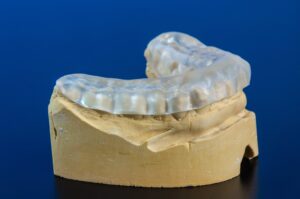Which night splint is right for you?
With stress, sleep apnoea and subsequent grinding on the rise, we often recommend our patients to wear a night splint. There are several options available, depending on their purpose:
Nylon Mandibular Advancement Splint – this is recommended for patients who have been diagnosed with mild to moderate sleep apnoea after having a comprehensive sleep study. It consists of two parts, one for lower and one for top jaw, acting to bring your lower jaw forward during sleep, thus stopping the jaw from falling back and blocking your airways. These splints can help with sleep apnoea, snoring and teeth grinding at night.
Nylon Occlusal Splint – these state of the art splints are quickly taking over the old-fashioned thick acrylic or soft splints that many patients are used to. They are suitable for patients who do not have sleep apnoea and just need to protect their teeth from night grinding/clenching. The splint is only 0.5mm thick, making it easy to get used to and very comfortable to wear. It acts as a cushion between your teeth, so any stress is taken by the splint rather than your teeth, preventing the enamel and fillings from cracking and chipping. These are made using an accurate computerised scan of your mouth and 3D printed for the most accurate fit.
Night retainer – this is a thin clear tray that needs to be worn over your teeth after orthodontic tooth straightening. Retainers prevent your teeth from moving back and should be worn at least 2-3 nights a week after your teeth have been straightened.
Not sure which one is right for you? Come in for a consultation with one of our dentists and they will recommend the most appropriate splint for your individual case.

Dental splint to prevent bruxism
